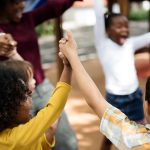By Dr. Carey Borkoski & Dr. Brianne Roos, originally published in Equity & Access
The transition back to school and transitions, in general, bring a flurry of emotions including excitement, worry, and nervousness. Each year, students, teachers, leaders, and families face a familiar uncertainty with changes in routines, expectations, people, and places. Rice (1997) and Anderson et al. (2000) describe aspects of the school transition as social discontinuity, which includes a sense of belonging. The need to belong is fundamental (Arslan, 2021), especially in school, because it contributes to enjoyment and feelings of ease and safety which, together, contribute to academic success (Ahn & Davis, 2020). Moreover, low levels of belonging result in decreased satisfaction, academic success, and teacher retention. Students, teachers, and leaders encounter different transitions, but their experiences in and with transitions are surprisingly similar. Our research and professional experiences identify a connection between school transitions and sense of belonging and that cultivating belonging requires time for self-exploration and reflection. To that end, we propose that the return to school routine includes time and attention devoted to the self – educators, leaders, students, and families alike.
Our preliminary findings on belonging in the global pandemic reveal that focused, internal work, and self-awareness contribute positively to our sense of belonging and the learning environments in which we find ourselves. Participants noted that attending to their own needs, bringing awareness to a moment, and making time for reflection in turn allowed them to prioritize belonging for their students. This was important because evidence also suggests that low levels of belonging may lead to loneliness and marginalization (Lim et al., 2021), which were especially problematic during the periods of physical distancing and remote schooling. Educators in our study described the challenges of multiple transitions to and from in-person, remote, and hybrid environments. They found that giving themselves time to figure out how they were feeling and what they needed was hard, but helpful in prioritizing the same kind of time and attention to self-care and belonging for their students. Brene Brown (2013) reminds us that our sense of belonging cannot be greater than our own level of self-acceptance. As we transition from summer to fall, what can we learn from our time away from school that might strengthen and routinize our habits of self-care and self-awareness, a kind of self-coaching, throughout the school year?
Internal Work of Belonging
It is important to remember that belonging starts with internal work – focusing on the teacher in the teaching and the learner in the learning. While we often focus on strategies to cultivate belonging in others, we suggest that belonging is fundamentally internal, and that we must belong to ourselves to feel a sense of belonging. Maya Angelou said: “You only are free when you realize you belong no place – you belong every place – no place at all. The price is high. The reward is great.” What do we know about this internal work? How can we do this work? The strategies that facilitate belonging depend on having a learner mindset and being curious and open to possibilities. Bringing awareness to our own moments and engaging in self-coaching requires us to curiously ask ourselves powerful questions, identify our core values and ways to honor them, and notice patterns of success to apply in other places. For many, summer represents a time for curiosity and openness to new insights and experiences.
Summer to School Transition
Sharing the highlights of summer break represent a familiar and traditional back-to-school routine. What would happen if, rather than focusing exclusively on summer events or activities, we brought awareness to how we showed up for our summer? What was important in those moments? What were the moments of connection with family and friends? Moments of peaceful disconnect? What did we do differently to invite in these moments of peace and connection? Summer offers an opportunity to learn if we pay attention and take intentional steps and time to reflect. Noticing and naming how we recognize and attend to our own needs during the summer, or how we value and prioritize ourselves, strengthens our sense of self-belonging. The feelings we experience during and after we slow down, stay present, reflect, and breathe deeply may offer insights into this self-work. Knowing what we need may help us tap into that summer calm and integrate those same strategies during the school year. Rather than abruptly ending the summer and beginning the fall, we can reframe this transition as an opportunity to integrate or blend the self-care and awareness of the summer moments with the return to school.
Bridging summer into fall means shifting back into days structured by routine, and even if the routine is familiar, each transition is unique. Meeting new people or learning new places and adjusting to new requirements can bring feelings of excitement about the opportunities ahead. Each fall brings the chance for growth, and that potential can also lead to worry and anxiety about finding a place, connecting with others, and achieving success. The school calendar, with continuity from the fall through the spring and disconnect over the summer, naturally leads to disrupted relationships between students and teachers, and a similarly interrupted connection with colleagues and even the physical classrooms and buildings where we work. Each fall transition includes refreshing existing relationships and establishing new ones, and relearning of rules, expectations, and routines. We have found that this external work is the most effective when it begins internally.
Strategies to do the Internal Work
Coaching, or self-coaching, operates on the assumption that individuals have what they need within, and there are several strategies to explore and discover aspects of us (and eventually others and even organizations) that contribute to belonging and growth. The following provides a brief discussion of a subset of these, including asking powerful questions, mining for core values, and staying present in a moment of reflection.
Coaching involves asking positive open-ended questions to explore and identify one’s strengths and possibilities. For example, if an individual is reflecting on a particularly difficult situation, it would be important to ask powerful questions to describe and examine the experience: What do you notice? What do you want to happen in this situation? What has worked in the past that you could apply here? Taking the time to ask purposeful, thoughtful questions contributes to increased self-awareness and a sense of belonging.
A second strategy for doing internal belonging work that also depends on asking good questions of us is interrogating core values or identifying deeply held fundamental beliefs and principles. Applied to summer break, we can recall days, weeks, and months since we were last in school. Think about the very best days, and then go deeper to the specific moments. What were you doing? Where were you? Who was there? What made that moment so memorable? What were the sights, sounds, and smells? Maybe it was being at the beach with family and friends, in a place away from home, surrounded by people who value you and make you laugh, while disconnecting from work. If so, perhaps time outdoors, connection, and levity are deeply held values. These are probably values all year long, not just in the summer.
With a learner mindset, we could reflect on the fact that we know our needs, and we can take the initiative to meet them all year long. During the summer we have the freedom to create the circumstances to meet those needs. Most of us cannot return to the beach and disconnect from work during the school year, but maybe there are ways to tap into some of your strengths and values as the year unfolds. If the outdoors, connection, and levity are important to you, take the steps to incorporate those into your daily or weekly routine. Just do it; prioritize walks outside, schedule dates with friends, do what brings you joy and makes you laugh. Intentionally recognizing our strengths, identifying core values, and taking the initiative to meet our own needs are concrete ways to improve belonging to ourselves, which is the prerequisite for helping others to feel like they belong.
As we return to school, let’s prioritize the teacher in the teaching and the learner in the learning by attending to belonging. When you notice, name, and respond to your own needs, your sense of belonging to yourself improves and contributes to creating inclusive spaces and places to support and cultivate belonging in our colleagues, students, and families.
Dr. Carey Borkoski is an Associate Professor at Johns Hopkins University where she holds a joint faculty appointment with the School of Education and the Bloomberg School of Public Health. Within the School of Education, she teaches research methods and advises doctoral students in the online EdD program. Her research explores the role of communities, bridging media like podcasts and TedTalks, and storytelling in facilitating student onboarding, promoting deeper learning, and mitigating anxiety around learning and engaging in often unfamiliar academic spaces. Connect with her at momentmcoaching.com
Dr. Brianne Roos is an Assistant Professor and director of the undergraduate program in the Department of Speech-Language-Hearing Sciences at Loyola University Maryland. Her career began as a clinician practicing medical speech-language pathology in hospital settings, where her favorite days were spent teaching and supervising students and new clinicians. She has been teaching in higher education for over 15 years and her areas of research include belonging, stress, well-being, and connection for students and faculty. Brianne facilitates workshops about teaching and learning for faculty across disciplines and she particularly enjoys the opportunity to develop and implement holistic onboarding programming to support new faculty. Brianne co-hosts a podcast about belonging, where she learns from a diverse range of guests and whose data contribute to research about belonging during the pandemic, in leadership, and in relationships. Always looking for alignment across established high-impact practices and innovative, engaged pedagogy, Brianne’s publications, presentations, podcasts, and classroom practices connect theoretical support with application that centers the whole person.
-
Dr. Brianne Rooshttps://ace-ed.org/author/broos/July 7, 2024
-
Dr. Brianne Rooshttps://ace-ed.org/author/broos/
-
Dr. Brianne Rooshttps://ace-ed.org/author/broos/February 27, 2023
-
Dr. Brianne Rooshttps://ace-ed.org/author/broos/November 18, 2022








